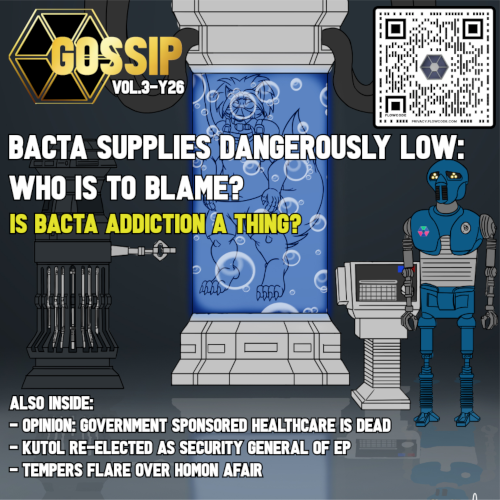Volume 3 – Year 26

With the universal acceptance of government sponsored healthcare continues to progress, the burden on the Ministry of Health (MoH) continues to grow; both financially and logistically.
The MoH is responsible for the healthcare of billions of citizens throughout CIS Space. From medical procedures to medical supplies, one ring of the government is tasked with keeping stocks full and operating rooms humming, as well as managing the hospitals in the network.
But since the acquisition and merger of the three medical systems previously housed in CIS space, and the establishment of the MoH, the department has been plagued by bad press. From long wait times, surging medical errors and poor quality of life standards for trainees, the MoH struggled to get off the ground as patient satisfaction scores hovered in the 15th percentile. The creation of Government sponsored care also placed an unprecedented burden on the CIS central government.
The last six months have been rather stable for the MoH, with wait times decreasing and patient quality scores going up, but behind the scenes, tension was brewing. Costs continue to skyrocket, as demand saw a sudden spike, especially in Tar Morden and Hassaria. While publicly, the MoH was managing this demand, Inside reports show that the MoH returned management of Bacta refinement in Foless and Boeus back to the local authorities. Disputed reports claim that the move was meant to improve production efficiency in the region, but others question the authenticity of this. The MoH has reported massive profits from public sales over the last few years, including large stockpiles to allies in the Endor Pact to offset costs.
As bacta refill stockpiles dwindled to danger levels, discussions from inside the MoH on how to address the problem has allegedly been heating up. Some members of the government have even discussed the potential of limiting access to “free” healthcare supplies. One suggestion included ways to breach the perceived “coverage gap” (also called the “donut hole”). After a participant reaches a designated amount of medical supplies used, they would enter a phase when they generally pay more for their drugs. One administrator at MoH, speaking under the guise of unanimity due to not having permission to share details, claimed that if something is not done, the Bacta crisis could affect access to the lifesaving Bacta refills needed for the Ministry of Defense. This is something the CIS Government will not allow, so the end result could be the death knell to the MoH. Not since the time of the corrupt Chiewab Amalgamated Pharmaceuticals has faith in our healthcare system been so fragile.
The expansion of socialized healthcare does not alone explain the increase in bacta demand, which has led to some exports asking if Bacta addiction is a thing? A quick literature search reveals no randomized controlled studies on the topic, but there have been several case reports on the topic. All of these low quality evidence sources claim the same thing: once a subject is exposed to bacta, use tends to steadily increase.
On a recent conference call, an unnamed source commented on the topic, acknowledging the fact that they have “Bacta addicted customers” and knowingly take advantage on the addiction to “clear out our inventory”. “Abusers of Bacta aren’t victims,” the MoH member stated on the conference call. “They are the victimizers.” When asked specifically about the lives that were being destroyed by addiction, he responded, “…I’ve never cared much for… members, if profit is to be made.” Another member of the MoH Leadership team allegedly responded with, “I have taken a similar model with my members.” Pretty damning.
Several “High Utilizers” of the MoH healthcare system are well known to local hospital networks and pharmacies, and some claim these people are simply taking advantage of the free healthcare, potentially selling their medicines on the side for profit. Even with free healthcare, there are citizens out there who have to go to the street to get their fix. Where does this come from? Has the MoH been mixing Bacta with other unknown or untested substances to try to meet demand? The answer to this is fuzzy at best. As the MoH is responsible to itself for purity standards, it is also an answer we will likely never get.
Another theory is that the increased demand is the explosion of combat sports throughout the CIS space. An effective fighting ring can burn through almost 100 Bacta Refills per day, as a public cost of 15 million credits. This can quickly add up as the popular sport expands. The CIS Government currently does sanction these fighting leagues, but there has been open discussions on some of the public forums about a forced limitation due to the mounting costs and concerns for safety, much to the displeasure of several civilian freedom activist groups.
If the MoH is forced to pull back on its claim for “Free Healthcare for All”, how will this affect public perception of the department. Some systems flocked to the CIS due to the promise of free care. Could this threaten the alliance as a whole? The answer remains unclear.
